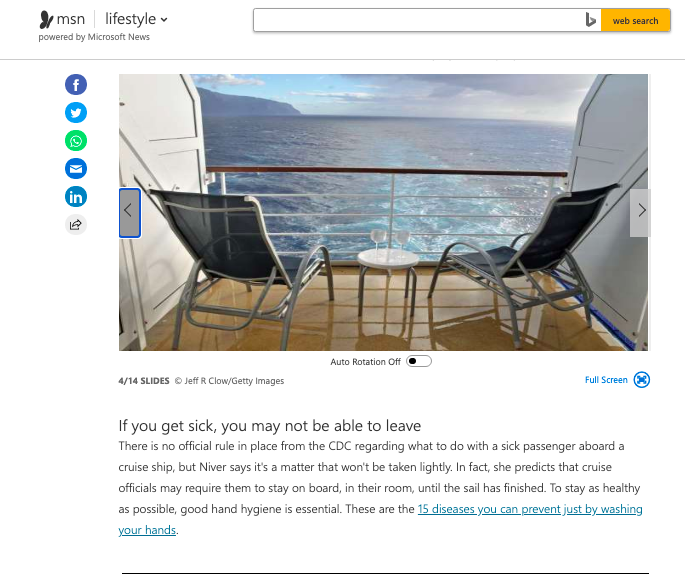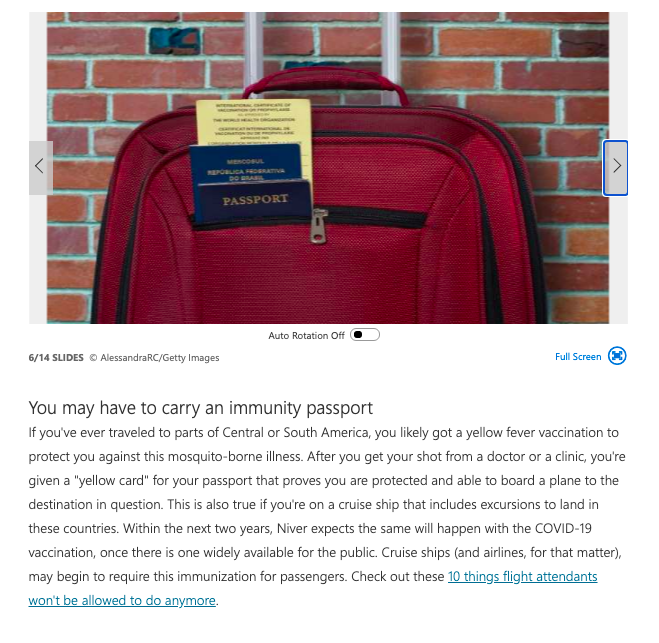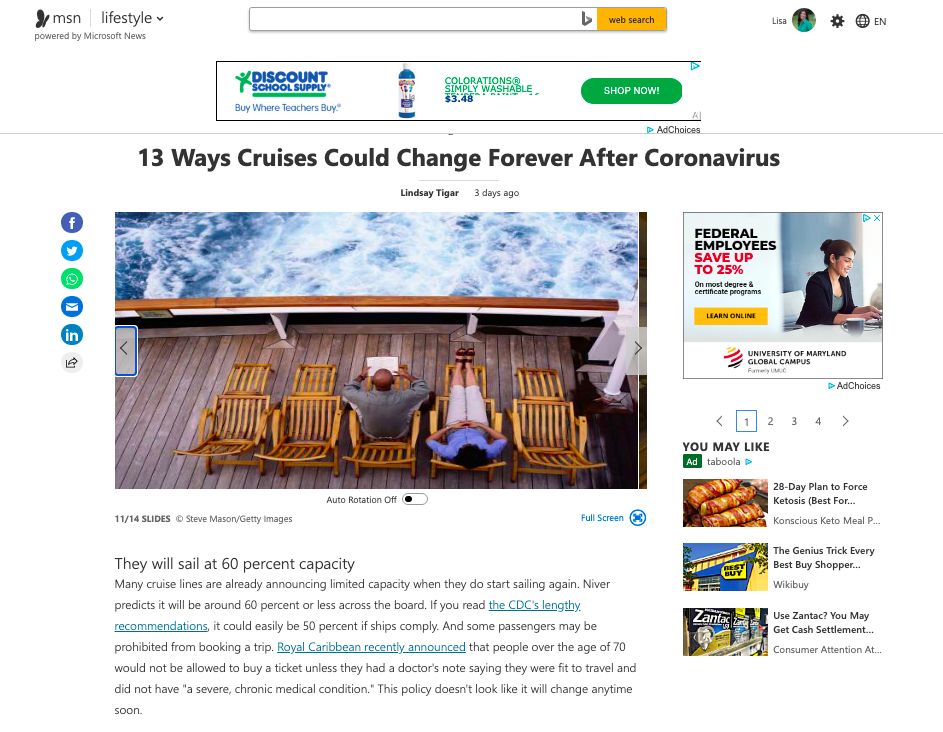Thank you to MSN, Lindsay Tigar and Reader’s Digest for including me in “13 Ways Cruises Could Change Forever After Coronavirus!”

Boarding will become much more complicated
Travel expert Lisa Niver has spent plenty of time aboard cruise ships. Not only is she a former senior assistant cruise director for Renaissance Cruises, but she also worked as a youth activities manager for Princess Cruises and a loyalty ambassador for Royal Caribbean. As we all start to think about the “new normal” of vacations, Niver predicts that boarding a cruise will be a tad more complicated. For starters, the new process will likely include a health questionnaire similar to those previously used for SARS, MERS, and norovirus. Cruise lines will also do their best to make sure you’re healthy before you step on board. “[They] will take people’s temperature before boarding, as many airlines are doing,” she predicts. “They may also use swabs or blood tests like the airlines.” Here’s how else flying could change after coronavirus.

If you get sick, you may not be able to leave
There is no official rule in place from the CDC regarding what to do with a sick passenger aboard a cruise ship, but Niver says it’s a matter that won’t be taken lightly. In fact, she predicts that cruise officials may require them to stay on board, in their room, until the sail has finished. To stay as healthy as possible, good hand hygiene is essential. These are the 15 diseases you can prevent just by washing your hands.

Some cruises may invest in onboard clinics
Many cruise ships already have onboard health clinics. However, they are usually small and meant for minor injuries and the rare emergency. As we look ahead, though, many cruises could expand these services to include more doctors and, potentially, quarantine areas, according to Niver. Having a designated area where vacationers can report to can provide peace of mind to all travelers. It also makes it much easier to contain and treat the potential spread of COVID-19 and other illnesses.

You may have to carry an immunity passport
If you’ve ever traveled to parts of Central or South America, you likely got a yellow fever vaccination to protect you against this mosquito-borne illness. After you get your shot from a doctor or a clinic, you’re given a “yellow card” for your passport that proves you are protected and able to board a plane to the destination in question. This is also true if you’re on a cruise ship that includes excursions to land in these countries. Within the next two years, Niver expects the same will happen with the COVID-19 vaccination, once there is one widely available for the public. Cruise ships (and airlines, for that matter), may begin to require this immunization for passengers.

Buffets may be a thing of the past
Talk to anyone who’s been on a cruise and they’ll rave about the unlimited access to the overflowing, delicious buffets that are available nearly 24/7. Carving stations, omelets made-to-order, and all the desserts you can imagine are part of the fun of the experience. Sadly, Niver says it may be a thing of the past since it’s hard to control germs in this type of setting. Ordering off of a menu or placing your order via an app may be the new standard. In fact, some cruise lines, like Royal Caribbean, are already removing their buffets, at least temporarily.
If buffets do stick around, it’ll look different than before. “Perhaps there will still be a buffet, but each part will have a server so that there is no contamination of the food,” Niver says. “[Or] it will be individual servings at the buffet—more like a grab-and-go at a coffee shop.”

“Knock and drop” will be more common
Already, Niver says hotels are doing contactless room service called “Knock and Drop.” As you can guess from the nickname, this is when you order food to your room, the hotel staff brings it, knocks at the door, and skedaddles. Niver says that those same tactics will likely be used on cruise ships, too. Though part of the luxury of staying away from your home is being waited on night and day, the pandemic may require a different type of distant hospitality. While we’re on the topic, these are the 10 things you probably won’t see in hotels anymore.

They will sail at 60 percent capacity
Many cruise lines are already announcing limited capacity when they do start sailing again. Niver predicts it will be around 60 percent or less across the board. If you read the CDC’s lengthy recommendations, it could easily be 50 percent if ships comply. And some passengers may be prohibited from booking a trip. Royal Caribbean recently announced that people over the age of 70 would not be allowed to buy a ticket unless they had a doctor’s note saying they were fit to travel and did not have “a severe, chronic medical condition.” This policy doesn’t look like it will change anytime soon.

More travelers will opt for family-sized suites
Whomever you board the ship with is part of your party, and therefore, you can be closer than six feet away from them. Thus, Niver predicts that couples, families, and friend groups will be more likely to opt for a family-sized suite to accommodate larger parties—and to have the ability to enjoy a private balcony without worrying about infection. Plus, your cabin will likely be one of the few places you won’t be required to wear a mask, so folks may spend more time inside than usual. By the way, these are the 6 times you have to wear a face mask—and the 3 times you don’t.

